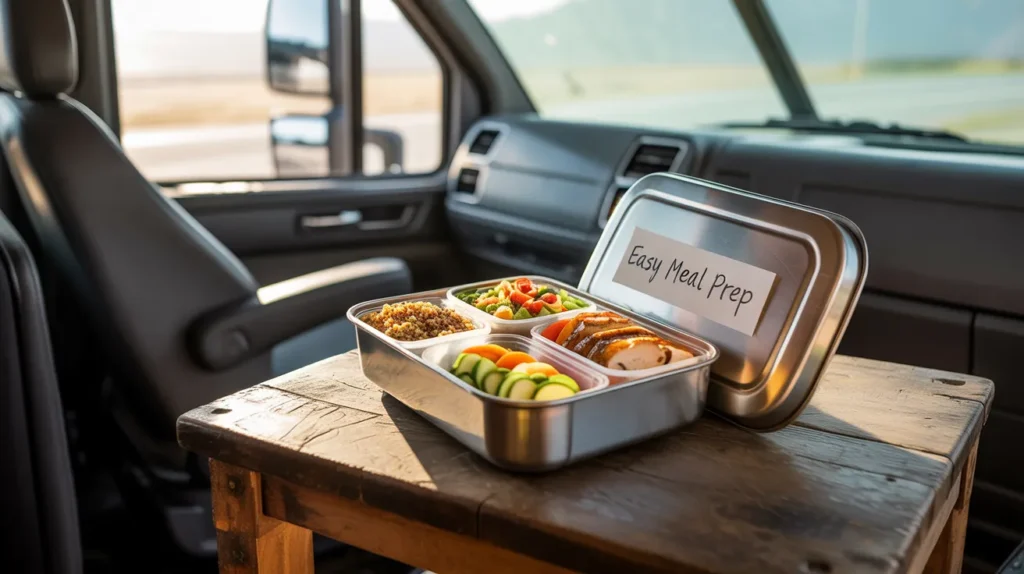Truck drivers spend long hours on the road, making it a significant challenge to maintain a healthy diet. Fast food, irregular meal times, and limited options often lead to fatigue and weight gain. With thoughtful planning, simple meal prep, healthy snacks, and better choices at truck stops, drivers can maintain energy and long-term health.
This guide offers practical, easy-to-follow tips for real-life situations, helping truckers make healthier choices without disrupting their busy schedules.
Why Healthy Eating Matters for Truck Drivers
Sitting long hours and eating quick, processed food makes truck drivers tired and more likely to gain weight or get health problems. Good food provides steady energy, better focus, and faster reaction times, all of which are essential for safe driving on the road. Eating well also helps mood, sleep, and long-term health (less risk of diabetes, heart problems). Small, steady changes such as swapping soda for water or packing a cooked meal add up quickly. Think of healthy food as fuel that helps you drive safer and feel better every day.
Familiar Food Challenges Truck Drivers Face
Life on the road can be challenging when it comes to food. Truck drivers often rely on fast food and gas station snacks due to their tight schedules. Healthy options are scarce at truck stops, and cooking is challenging without access to a kitchen. Long driving hours often mean meals are skipped or eaten late, which can negatively impact energy levels. Cravings for fried or sugary foods also get stronger during long trips. These habits may seem insignificant, but over time, they can contribute to serious health issues. Recognising these challenges is the first step toward addressing them.
Easy Meal Prep Tips for Truck Drivers

Planning meals before hitting the road makes a big difference. Simple prep keeps you full, saves money, and avoids unhealthy fast food. Even small steps help maintain energy and focus during long drives.
Tips:
- Cook at home: grilled chicken, rice, pasta, or stir-fried veggies.
- Use containers or jars: easy to store and eat.
- Carry a cooler: keeps food fresh for days.
- Easy-to-grab meals include sandwiches, wraps, salads, and boiled eggs.
- Batch cook: prepare once, eat multiple times.
Best Healthy Snacks for Long Haul Truckers
Healthy snacks keep truckers energised and prevent fast-food cravings on long drives.
Healthy Snack Ideas:
- Nuts and seeds such as almonds, walnuts, or sunflower seeds provide protein, healthy fats, and lasting energy.
- Fruits, such as apples and bananas, are portable, naturally sweet, and full of vitamins.
- Boiled eggs are high in protein, easy to prepare, and keep you full longer.
- Greek yoghurt cups – packed with protein, support digestion, and provide steady energy.
- Veggie sticks with hummus – enjoy carrots, celery, or cucumber with hummus for a crunchy and nutritious treat.
- Low-sugar protein bars – quick, convenient, and pre-workout drives. These are great
- egg sticks –a small, portable source of calcium and protein.
How to Make Smart Choices at Truck Stops and Gas Stations

Truck stops often have limited healthy options, but wise choices can keep your diet on track. Small swaps make a big difference for energy and health.
Tips for Smart Choices:
- Choose grilled over fried – grilled chicken or fish is healthier than fried items.
- Add extra vegetables – swap fries for a salad or ask for extra veggies in your meal.
- Watch portion sizes – order half meals or share large portions to avoid overeating.
- Skip sugary drinks – water or unsweetened drinks keep you hydrated without extra calories.
- Read labels when possible – check sodium, sugar, and fat content on packaged items.
- Choose simple, fresh foods – fruits, salads, or yoghurt cups are preferable to packaged snacks.
High-Protein and Energy-Boosting Foods
Protein keeps truck drivers full, supports muscles, and maintains steady energy for long drives. Including these foods helps avoid fatigue and mid-day crashes.
Best Options:
- Lean meats, such as chicken, turkey, and tuna packets, are easy to cook or pack.
- Eggs –whether boiled or scrambled – provide high-quality protein and essential nutrients.
- Greek yoghurt – protein-rich and keeps energy stable.
- Legumes and lentils – cooked beans or lentils are filling and nutritious.
- Peanut butter – a good source of protein and healthy fats, paired with fruit or whole-grain bread.
- Whole grains – oats, brown rice, or whole-grain bread give lasting energy.
Hydration Tips: Staying Energised While Driving
Staying hydrated is key to focus and energy on long drives. Dehydration can cause fatigue, headaches, and slower reaction time.
Hydration Tips:
- Carry a refillable water bottle – sip water regularly throughout the day.
- Set simple goals – aim for 2–3 litres of water per day, depending on your climate and activity level. level
- Avoid sugary drinks – soda and energy drinks give quick spikes but lead to crashes.
- Include hydrating snacks – fruits like oranges or watermelon can add extra hydration.
- Take water breaks – stop every couple of hours to stretch and refill your water.
Which Foods Should Truck Drivers Avoid on the Road?
Certain foods can deplete energy, contribute to weight gain, or make long drives uncomfortable. Avoiding them helps maintain focus and overall health.
Foods to Avoid:
- Sugary snacks and drinks – candy, soda, and energy drinks cause quick spikes and crashes.
- Fried foods – burgers, fries, and fried chicken are high in unhealthy fats and calories.
- Processed packaged snacks – chips, cookies, and instant noodles offer little nutrition.
- Large fast-food meals – heavy meals can make you sluggish and slow your reaction time.
- High-sodium foods – excess salt can lead to dehydration and bloating.
How Can Truck Drivers Manage Weight Through Diet?
Maintaining a healthy weight while travelling is achievable with small, consistent food habits. Smart meal planning and portion control help maintain energy without gaining extra pounds.
Tips for Weight Management:
- Eat smaller, more frequent meals – this keeps your metabolism active and helps avoid overeating.
- Balance proteins, carbs, and fats – include lean meats, whole grains, and healthy fats in each meal.
- Plan meals – packing breakfast and lunch prevents fast-food temptation.
- Choose healthy snacks, such as fruits, yoghurt, or any other healthy option.
- Move whenever possible – stretch, walk around the truck stop, or do light exercises.
- Track progress – simple food logs or apps help stay accountable.
FAQ’s
Q1: What if I don’t have a fridge in my truck?
A1: Use insulated coolers or ice packs to keep fruits, boiled eggs, yoghurt, and sandwiches fresh for several hours. Non-perishable snacks, such as nuts and protein bars, are also great options.
Q2: How can I eat healthy at a truck stop?
A2: Look for grilled options, add extra vegetables, skip fries and sugary drinks, and choose fruits, salads, or yoghurt cups whenever available.
Q3: What are the easiest healthy snacks to carry on long drives?
A3: Nuts, seeds, boiled eggs, fresh fruits, veggie sticks with hummus, Greek yoghurt cups, low-sugar protein bars, and cheese sticks are all portable and nutritious.
Q4: How can I avoid fast-food temptation on long trips?
A4: Meal prep at home, pack healthy snacks, plan meal stops, and always keep water or healthy drinks handy. Even one prepared meal can reduce fast-food cravings.
Q5: How much water should a truck driver drink daily?
A5: Aim for 2–3 litres per day, adjusting for climate and activity. Take small sips frequently and incorporate hydrating foods, such as water, to boost your water intake.
Conclusion
Eating healthy as a truck driver is possible with simple planning. Pack meals, choose nutritious snacks, make informed choices at truck stops, and stay hydrated. Balance proteins, carbs, and fats while avoiding junk and sugary foods. Taking small, consistent steps can improve energy, focus, and overall long-term health. Start with one change today, and your road trips will feel healthier and more manageable.


